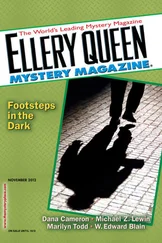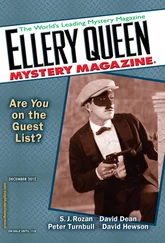“Within a few years,” continued Jimmy, “Cazalis was one of the leading specialists in the East. As I get the picture, he’d moved in on the ground floor and by 1911 or ’12, when the specialty had become defined, he had one of the biggest practices in New York. He wasn’t a money-grubber, I understand, although he made pots. He was always more interested in the creative side of his profession, pioneered a couple of new techniques, did a lot of clinic work, and so on. I’ve got lots of dope here on his scientific achievements—”
“Skip it. What else?”
“Well, there’s his war record.”
“World War I.”
“Yes.”
“When did he go in?”
“Summer of 1917.”
“Interesting, Dad. Beatrice Willikins was born on April 7 that year, the day after Congress declared war on Germany. Must have been one of Cazalis’s last deliveries before getting into uniform.” The Inspector said nothing. “What about his war record?”
“Tops. He went into the Medical Corps as a captain and came out a full colonel. Surgery up front—”
“Ever wounded?”
“No, but he did spend a few months in a French rest area in ’18, and in early ’19 after the war ended. Under treatment for — I quote — ‘exhaustion and shell shock.’”
Ellery glanced at his father, but the Inspector was pouring his fourth, fifth, and sixth finger of whiskey.
“Apparently it wasn’t anything serious.” Jimmy glanced at his envelope. “He was sent home from France as good as new and when he was mustered out—”
“In 1919.”
“—he went back to his specialty. By the end of 1920 he’d worked up his practice again and was going great guns.”
“Still doing obstetrics and gynecology exclusively?”
“That’s right. He was then in his late 30s, approaching his prime, and in the next five years or so he really hit the top.” Jimmy hauled out another envelope. “Let’s see... yes, 1926. In 1926 he met Mrs. Cazalis through her sister, Mrs. Richardson — and married her. She was one of the Merigrews of Bangor. Old New England family — blood transparent, blue, and souring, but I’m told she was a genetic sport, very pretty, if you went for Dresden china. Cazalis was 44 and his bride was only 19, but apparently he had Dresden china ideas; it seems to have been an epic romance. They had a fancy wedding in Maine and a long honeymoon. Paris, Vienna, and Rome.
“I find,” said Jimmy McKell, “I find nothing to indicate that the Cazalises have been anything but happily married — in case you’re interested. No whisper about him, in spite of all the ladies in his medical life, and for Mrs. Cazalis there’s never been any man but her husband.
“They ran into hard luck, though. In 1927 Mrs. Cazalis had her first baby and early in 1930 her second—”
“And lost both in the delivery room,” nodded Ellery. “Cazalis mentioned that the night I met him.”
“He felt terrible about it, I’m told. He’d taken fanatical care of his wife during both pregnancies and he’d done the deliveries himself — what’s the matter?”
“Cazalis was his wife’s obstetrician?”
“Yes.” Jimmy looked at them both. Inspector Queen was now at the window, pulling at his fingers behind his back.
“Isn’t that unethical?” asked the Inspector casually. “A doctor delivering his own wife?”
“Hell, no. Most doctors don’t do it because they’re emotionally involved with the woman in labor. They doubt their ability to maintain — where’s that note? — to maintain ‘the necessary objective, detached professional attitude.’ But many doctors do, and Dr. Edward Cazalis of the Tearing Twenties was one of them.”
“After all,” said the Inspector to Ellery, as if Ellery were arguing the point, “he was a big man in his field.”
“The type man,” said Jimmy, “so supremely egocentric he’d maybe become a psychiatrist. Hm?”
“I don’t think that’s quite fair to psychiatrists,” laughed Ellery. “Any data on the two babies he lost?”
“All I know about it is that both babies were toughies and that after the second Mrs. Cazalis couldn’t have any more children. I gathered that they were both breeches.”
“Go on.”
The Inspector came back and sat down with his bottle.
“In the year 1930, a few months after they lost their second child, we find Cazalis having a breakdown.”
“Breakdown,” said Ellery.
“Breakdown?” said the Inspector.
“Yes. He’d been driving himself, he was 48 — his collapse was attributed to overwork. By this time he’d been practicing obstetrical and gynecological medicine for over twenty-five years, he was a wealthy man, so he gave up his practice and Mrs. Cazalis took him traveling. They went on a world cruise — you know the kind, through the Canal up to Seattle, then across the Pacific — and by the time they reached Europe Cazalis was practically well again. Only, he wasn’t. While they were in Vienna — this was early in ’31 — he had a setback.”
“Setback?” said Ellery sharply. “You mean another breakdown?”
“‘Setback’ was the word. It was nerves again, or mental depression or something. Anyway, being in Vienna, he went to see Béla Seligmann and—”
“Who’s Béla Seligmann?” demanded Inspector Queen.
“Who’s Béla Seligmann, he says. Why, Béla Seligmann is—”
“There was Freud,” said Ellery, “and there’s Jung, and there’s Seligmann. Like Jung, the old boy hangs on.”
“Yes, he’s still around. Seligmann got out of Austria just in time to observe Anschluss from an honored bleacher seat in London, but he went back to Vienna after the little cremation ceremony in the Berlin Chancellery and I believe he’s still there. He’s over 80 now, but in 1931 he was at the height of his powers. Well, it seems Seligmann took a great interest in Cazalis, because he snapped him out of whatever was wrong with him and aroused in the guy an ambition to become a psychiatrist.”
“He studied with Seligmann?”
“For four years — one under par, I’m told. Cazalis spent some time in Zürich, too, and then in 1935 the Cazalises returned to the States. He put in over a year getting hospital experience and early in 1937 — let’s see, that would have made him 55 — he set himself up in the practice of psychiatry in New York. The rest is history.” Jimmy laced his nagging glass.
“That’s all you got, Jimmy?”
“Yes. No.” Jimmy referred hastily to his last envelope. “There’s one other item of interest. About a year ago — last October — Cazalis broke down again.”
“Broke down?”
“Now don’t go asking me for clinical details. I don’t have access to medical records. Maybe it was plain pooping out from overwork — he has a racehorse’s energy and he’s never spared himself. And, of course, he was 66. It wasn’t much of a breakdown but it must have scared him, because he started to whittle down his practice. I understand he hasn’t taken a new case in a year. He’s polishing off the patients under treatment and transferring long-termers to other men when he can. I’m told that within a short time he’ll be retiring.” Jimmy tossed his collection of disreputable envelopes on the table. “End of report.”
The envelopes lay there.
“Thanks, Jimmy,” said Ellery in a curiously final voice.
“Is it what you wanted?”
“What I wanted?”
“Well, expected.”
Ellery said carefully, “It’s a very interesting report.”
Jimmy set his glass down. “I take it you shamans want to be alone.”
Neither man replied.
“Never let it be said,” said Jimmy, picking up his hat, “that a McKell, couldn’t recognize a brush.”
Читать дальше












